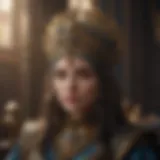Exploring the Unknown: Insights from Astrology and Tarot
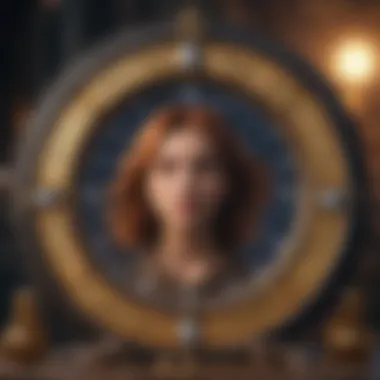

Intro
Astrology and Tarot are two ancient practices that have captivated the minds of many. They offer frameworks for understanding personal paths, decisions, and futures. Both practices provide valuable insights that can guide individuals as they navigate life's complexities. This article explores the fundamentals of astrology and tarot, aiming to illuminate how these tools can aid personal and professional growth. Each section will delve into specific aspects that contribute to a deeper understanding of your future through these mystic arts.
Characteristics of Each Zodiac Sign
The Zodiac is composed of twelve signs, each associated with distinct personality traits. Understanding these characteristics can help individuals recognize their own strengths and weaknesses, as well as those of others in their lives.
Overview of Personality Traits
Each sign, from Aries to Pisces, exhibits unique attributes. For instance, Aries is often seen as bold and enthusiastic, while Taurus is known for being reliable and practical. This variability shapes how individuals approach life and relationships.
Strengths and Weaknesses
Here are some key traits:
- Aries: Assertive; impulsive
- Taurus: Patient; stubborn
- Gemini: Adaptive; indecisive
- Cancer: Nurturing; moody
- Leo: Charismatic; arrogant
- Virgo: Detail-oriented; critical
- Libra: Diplomatic; indecisive
- Scorpio: Intense; secretive
- Sagittarius: Optimistic; reckless
- Capricorn: Disciplined; pessimistic
- Aquarius: Innovative; aloof
- Pisces: Compassionate; escapist
Compatibility with Other Signs
Compatibility can also influence personal dynamics. Water signs like Cancer, Scorpio, and Pisces may connect well with Earth signs such as Taurus and Capricorn. Understanding these relationships can enhance interactions and planning in both personal and professional environments.
Daily, Weekly, Monthly Horoscopes
For many, horoscopes serve as daily reflections, prompting individuals to contemplate their current pathways.
Predictions for Each Zodiac Sign
Daily horoscopes provide immediate insights that help set the tone for the day. Weekly and monthly forecasts can also reveal trends that appear more broadly, allowing for better long-term planning.
Key Areas to Focus On
Every reading often highlights specific areas needing attention, such as:
- Career Opportunities
- Personal Growth
- Relationship Dynamics These areas can inform decisions and ignite proactive behavior.
Love and Relationships Horoscopes
This segment focuses exclusively on romantic entanglements. Horoscopes can offer insights into both relationship strengths and challenges. They may provide clarity on emotional conflicts or suggest methods for improvement, guiding individuals through their romantic lives with greater awareness.
How to Interpret Tarot Cards
Tarot offers another lens through which to view personal journeys, structured through a unique deck and methodology.
Major and Minor Arcana
The Tarot deck comprises 78 cards: 22 Major Arcana cards, representing significant life events, and 56 Minor Arcana cards, which reflect daily experiences.
Meaning of Key Cards
Key cards, such as The Fool, The Lovers, and The Tower, each carry profound implications based on their position and surrounding cards.
Sample Interpretations in Different Spreads
The context in which cards are drawn, through various spreads like the Celtic Cross or three-card spread, changes their meanings significantly.
Overview of Deck Styles
Different decks, such as Rider-Waite, Thoth, and others, offer stylistic nuances that can affect interpretations.
Popular Decks and Their Unique Features
Rider-Waite is known for its rich imagery and symbolism, while Thoth boasts an esoteric approach. Understanding these differences expands interpretative possibilities.
Understanding Birth Charts
A birth chart maps the position of celestial bodies at the time of an individual's birth. This information helps reveal personality traits, tendencies, and potential paths.
Components of a Birth Chart
Key components include:
- Sun Sign: Core identity
- Moon Sign: Emotional nature
- Rising Sign: First impressions
How to Interpret Planetary Positions
Planetary positions within signs and houses reveal nuances in a person's character and life experiences.
Impact of Zodiac Signs on Personality
Understanding how different signs influence individuals can provide clarity on behavioral responses and choices.
Astrological Events and Celestial Occurrences
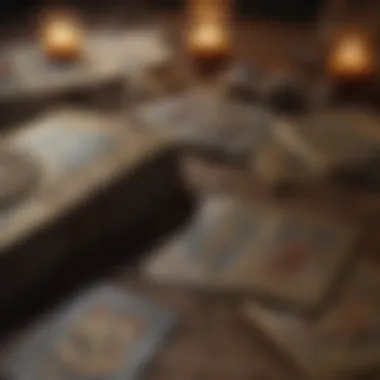

Certain celestial events can serve as auspicious moments for reflection and decision-making.
Lunar and Solar Eclipses
Eclipses often signify endings and new beginnings, making them powerful for personal revelations.
Retrogrades of Planets
Planet retrogrades, often seen as challenging phases, can serve as opportunities for introspection and reassessment.
Key Astrological Dates to Watch Out For
Notable dates include equinoxes, solstices, and planetary alignments, which can influence overall energies.
Beginners Guide to Astrology
For those new to astrology, grasping the fundamentals is essential. Understanding horoscopes, zodiac signs, tarot, and astrology at a basic level prepares individuals for deeper exploration.
Utilizing Insights from Readings for Personal Development
Insights gained from astrology and tarot readings can be applied practically to foster personal growth, aiding individuals in their journeys towards understanding and agency in their own lives.
By exploring these practices, individuals can seek clarity in their futures, employing the wisdom of astrology and tarot to inform their decisions and navigate their paths more effectively.
Prelude to Astrology and Tarot
Astrology and tarot have fascinated humans for centuries. These methods of divination aim to provide insight and clarity about personal futures. Understanding astrology and tarot is more than just an intellectual exercise; it can be a transformative experience that aids individuals in navigating complex life situations. This article seeks to explore these tools, drawing connections between cosmic movements and personal destiny.
Astrology relates to the positioning of celestial bodies and how they influence human experiences. By examining one’s birth chart, individuals can gain awareness of their personality traits and motivations. Tarot, on the other hand, uses a deck of cards to reflect subconscious insights and emotions. Combined, these practices allow for a holistic approach to understanding oneself and making informed decisions.
The benefits of engaging with astrology and tarot are manifold. Both practices encourage self-reflection and a deeper understanding of one's path. They can enhance decision-making processes by providing various perspectives. Additionally, they foster a sense of connection to the universe and to the self, which can be comforting during uncertain times.
Yet, there are considerations. It’s important to approach these disciplines with an open yet critical mind. Understanding their roots and historical context can provide valuable insights into their relevance today. As we delve deeper, we will define astrology and tarot, explore their historical significance, and lay the foundation for their practical applications.
Defining Astrology and Tarot
Astrology is the study of the movements and positions of celestial bodies, such as planets and stars, in relation to human affairs. Astrologers interpret the alignment of these bodies at the time of an individual's birth to discern traits, tendencies, and potential life paths. Various branches of astrology exist, with Western astrology being the most commonly recognized.
Tarot, in contrast, is a divination tool that uses a set of cards, typically 78 in total, to convey insights about the past, present, or future. Each card symbolizes different energies and concepts. The interpretation of tarot depends on the context of the question asked, along with the position of the cards drawn. The unique aspect of tarot lies in its ability to tap into intuitive understandings, providing guidance through symbolic imagery.
The Historical Context of Divination
The practice of divination, including both astrology and tarot, has ancient origins. Astrology can be traced back thousands of years to Babylonian practices. The ancient Babylonians were among the first to document celestial movements and their correlations to earthly events. Over time, astrology spread to various cultures, including the Greeks who added philosophical dimensions to its practice.
Tarot's history is a bit different. Its origins are murky, but it is believed to have evolved from playing card games in the 15th century. It gained popularity in France and Italy, transitioning from a mere game to a mystical and divinatory tool. The tarot deck has since absorbed cultural symbols and mythology, enriching its interpretative layers.
Both astrology and tarot have deep roots that influence contemporary practices. Understanding their development enhances appreciation of their relevance and functionality in modern life.
The Role of Horoscopes in Understanding the Future
Horoscopes serve as a valuable tool for individuals seeking insights into their future. These astrological forecasts are not mere entertainment; they offer a framework that integrates celestial movements with personal experiences. Understanding horoscopes can empower decision-making and help individuals navigate life's complexities.
How Horoscopes Predict Personal Trends
Horoscopes predict personal trends by examining the movements and positions of celestial bodies, particularly in relation to an individual’s birth chart. Each person has a unique birth chart based on the exact time, date, and location of their birth. This chart, often called a natal chart, serves as a blueprint of potential characteristics and experiences.
- Sun Sign: This derives from the position of the sun at the time of birth. It is commonly understood and influences core personality traits.
- Moon Sign: The moon’s position impacts emotional responses, providing insight into feelings and subconscious influences.
- Rising Sign: Also known as Ascendant, it indicates how others perceive an individual and influences first impressions.
Through horoscopes, astrologers can analyze how these signs interact with current planetary movements, revealing trends that affect daily life. For example, a strong aspect between Mars and Venus may signal a period of heightened creativity or emotional intensity.
Interpreting Daily, Weekly, and Monthly Forecasts
The interpretation of daily, weekly, and monthly horoscopes varies in depth and focus. Daily forecasts often provide immediate influences that may affect one’s day-to-day activities.
- Daily Forecasts: These typically highlight immediate planetary alignments, indicating challenges or opportunities for the present day. They can guide decisions, such as whether it is a favorable time for social interactions or introspection.
- Weekly Forecasts: A broader overview is presented in weekly horoscopes. These look at the main astrological events occurring that week, helping individuals align their efforts with the cosmic rhythm. For instance, significant alignments like a full moon may suggest a time for closure or completion.
- Monthly Forecasts: Monthly horoscopes offer a long-term perspective. They examine larger trends, such as planetary retrogrades, which could indicate periods of reflection or reevaluation. Understanding these trends helps individuals plan their major commitments and personal projects effectively.
Horoscopes provide not just predictions but a language to understand the interconnectedness of our lives with the cosmos.
In sum, the role of horoscopes extends beyond simple predictions. They encourage individuals to engage with their authentic selves and the world around them, shaping informed choices that lead to personal growth.
Zodiac Signs and Their Influence on Personalities
Zodiac signs serve as a framework through which personal tendencies, traits, and behaviors can be understood. Astrology posits that celestial bodies and their positions at the time of one’s birth can influence individual characteristics and predispositions. This section will explore how these astrological indicators shape personality types and interpersonal dynamics. Understanding zodiac signs is not just about entertainment; it offers a lens through which individuals can better understand themselves and others. This exploration can aid in fostering better relationships, enhancing communication, and making informed choices in personal and professional life.
Exploring Zodiac Traits and Characteristics
Each of the twelve zodiac signs possesses distinct traits that contribute to a person's overall persona. Here are some notable characteristics associated with each sign:
- Aries: Assertive, energetic, and competitive.
- Taurus: Reliable, patient, and practical.
- Gemini: Versatile, sociable, and curious.
- Cancer: Intuitive, emotional, and nurturing.
- Leo: Confident, outgoing, and charismatic.
- Virgo: Analytical, meticulous, and service-oriented.
- Libra: Diplomatic, artistic, and relationship-focused.
- Scorpio: Passionate, resourceful, and determined.
- Sagittarius: Adventurous, optimistic, and philosophical.
- Capricorn: Disciplined, responsible, and ambitious.
- Aquarius: Innovative, humanitarian, and independent.
- Pisces: Compassionate, artistic, and intuitive.
These traits foster unique ways of relating to the world and others. A deeper awareness of one’s zodiac sign can lead to professional growth and improved personal relationships as people recognize patterns in their behavior and that of others. Moreover, individuals can leverage their strengths according to their signs while working on areas that might need growth.
Compatibility Among Zodiac Signs
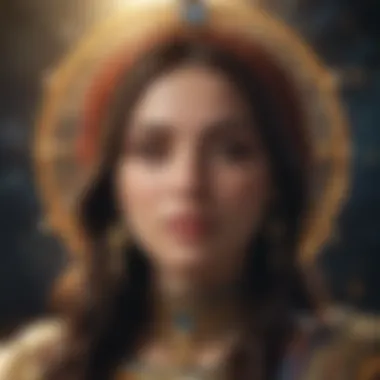

Understanding compatibility among zodiac signs can provide insight into relationships, be they romantic, platonic, or professional. Some signs naturally align with others due to similar qualities or complementary traits. Here’s a brief examination of some significant compatibilities:
- Fire Signs (Aries, Leo, Sagittarius): Known for their passion and dynamism, they often connect deeply with each other.
- Earth Signs (Taurus, Virgo, Capricorn): Practical and grounded, they work well together to achieve common goals.
- Air Signs (Gemini, Libra, Aquarius): These signs thrive on communication and intellect, often forming strong friendships.
- Water Signs (Cancer, Scorpio, Pisces): Emotional and intuitive, they share deep bonds and understand each other's sensitivities.
However, it is important to remember that while zodiac compatibility can guide expectations in relationships, personal growth, communication, and shared values ultimately define the strength and depth of those connections.
Understanding one’s zodiac sign and characteristics can illuminate personal dynamics, paving the way for more enriching interactions in various aspects of life.
Individuals engaged in the study of astrology can benefit profoundly from analyzing these traits and compatibilities, as it widens their insight into human behavior and relationship patterns.
Understanding Tarot Readings
Tarot readings serve as an influential tool for gaining insight into one's life and future. By tapping into the symbolism and energy reflected through the cards, individuals can explore deeper truths about their current situations. Importantly, tarot is not merely about predicting what will happen; it is about understanding the dynamics at play in one's life. This section aims to dissect the components of tarot readings, providing a clear understanding of how they function and their significance.
The Structure of a Tarot Deck
A typical tarot deck consists of 78 cards divided into two main sections: the Major Arcana and the Minor Arcana. Each section plays a distinct yet interconnected role in tarot readings.
- Major Arcana: This comprises 22 cards, each representing significant life events, spiritual lessons, or archetypal themes. Cards like The Fool, The Lovers, and Death evoke profound insights into life's journey, highlighting the essential paths and transformations an individual may encounter.
- Minor Arcana: Composed of 56 cards, these are further divided into four suits: Cups, Pentacles, Swords, and Wands. Each suit pertains to aspects of everyday experiences. For instance, Cups often signify emotions and relationships, while Swords relate to thoughts and conflicts. Within each suit, cards are numbered from Ace to Ten, plus four court cards (Page, Knight, Queen, and King) that can represent personalities or energies.
This structural setup enables users to delve into specific areas of inquiry, offering revelations that are both relevant and personal. Understanding how these components interrelate is crucial for accurate interpretations.
Common Tarot Spreads and Their Meanings
Tarot spreads refer to the specific layout of cards used during a reading. The arrangement of these cards allows the reader to focus on different aspects of the querent’s life. Here are some popular tarot spreads and their interpretations:
- Three-Card Spread: This simple spread typically covers the past, present, and future. It is favored for its clarity and directness. By drawing three cards, the reader can quickly gauge the storyline behind the querent's circumstances.
- Celtic Cross Spread: A more complex arrangement featuring ten cards, the Celtic Cross provides a comprehensive overview of factor influencing the querent’s question. It includes positions for present situation, challenges, past influences, and future possibilities.
- Single Card Draw: This straightforward method offers immediate insights. The querent draws one card that can serve as a focus for the day or a response to a specific question.
Understanding the meanings behind the cards in these spreads is essential for effective readings. Each card carries layers of interpretation based on its position, and a well-informed reader can weave these meanings into a coherent narrative.
"Tarot serves not only as a guide but as a mirror, reflecting the querent's inner world and prompting introspection."
Ultimately, effective tarot readings stem from a combination of card meanings, intuition, and the context of the querent's life. Integrating these elements empowers readers to offer nuanced guidance that resonates on multiple levels.
Astrological Forecasting and Its Pragmatic Uses
Astrological forecasting offers valuable insights into the cycles and trends influencing an individual's life. This aspect of astrology can guide decision-making, enhance personal awareness, and help individuals align with cosmic rhythms. With detailed astrological charts and calculations, practitioners can interpret how different celestial events may affect personal circumstances.
Forecasting allows us to understand auspicious times for certain activities like starting a new job, engaging in relationships, or making significant life changes. This proactive approach provides a framework for navigating life’s uncertainties with more clarity and intention. Moreover, it emphasizes the importance of timing and situational awareness rather than simply resigning to fate.
This section will further explore key elements and benefits of astrological forecasting. When one understands the timing of celestial bodies, they can navigate life choices with greater insight.
Creating Personal Birth Charts
Creating a personal birth chart is a foundational step in astrology. This chart represents the positions of planets at an individual's time of birth. The chart includes the Sun, Moon, and planets in their respective signs and houses. Each element of the chart holds significant meaning, influencing personality traits, emotional responses, and potential life events.
A well-constructed birth chart serves as a blueprint for understanding an individual’s innate tendencies. Elements to consider include:
- Sun Sign: Reflects core identity and ego.
- Moon Sign: Represents emotional nature and inner self.
- Rising Sign (Ascendant): Indicates outward behavior and first impressions.
Interpreting this chart can offer invaluable insights into personal strengths and challenges, helping individuals make informed life choices. The birth chart acts as a compass for navigating life's journey, providing significant context to astrological forecasts.
Future Predictions Based on Transits
Transits are essential for astrological forecasting as they describe the movement of planets and their interactions with natal chart placements. By observing these transits, astrologers can forecast potential influences on a person’s life. This can include changes in relationships, career paths, and personal development.
Key aspects of transits include:
- Conjunctions: When two celestial bodies align, indicating new beginnings.
- Squares: Suggesting challenges and obstacles that test personal resolve.
- Trines: Signifying ease and support for ambitions and goals.
Understanding transits equips practitioners with the capacity to anticipate shifts and make proactive decisions. By considering these astrological influences, individuals can better prepare for upcoming phases, thereby making choices that align with their goals and values.
"Astrological predictions are not an absolute; they provide guidance grounded in celestial patterns that humans can navigate with free will."
Astrological forecasting ultimately allows individuals to harmonize their aspirations with the universe. It empowers them to recognize when to act and when to reflect, aiding them in steering their paths toward fulfillment. This understanding offers an enriched experience, transforming astrology from mere predictions into practical tools for living in alignment with the cosmos.
The Intersection of Free Will and Destiny
The exploration of free will and destiny poses significant questions for individuals delving into astrology and tarot. This intersection plays a crucial role in understanding how these practices can inform our decisions and shape our futures. Key elements include the nature of personal agency and the impact of cosmic or mystical influences. By discussing free will, we can reflect on how personal choices interact with predetermined patterns evident in astrological readings and tarot cards. This understanding helps individuals gain insight into their life paths while recognizing their role in shaping outcomes.
Philosophical Implications of Predetermined Futures
Examining the philosophical aspect of predetermined futures reveals varied perspectives. Different schools of thought present ideas about whether our lives are scripted by cosmic forces or if we have the capacity to alter our fate through choices. Astrology suggests a framework influenced by celestial alignments, while tarot provides symbolic representations of life's challenges and opportunities.
- Many astrological proponents argue that while the stars may indicate trends and potentialities, the individual still holds the power of choice.
- Conversely, some view these practices as deterministic, suggesting that awareness of one’s astrological or tarot insights leads to a preordained path.
Engaging with these theories encourages a deeper understanding of how we reconcile our personal narratives with seemingly predetermined elements.
Making Informed Decisions Through Divination
Divination through astrology and tarot can serve as a guide in decision-making processes. By utilizing insights gained from these practices, individuals can approach situations more strategically. This can involve:
- Identifying Personal Strengths: Astrology can reveal favorable traits associated with one's zodiac sign.
- Assessing Timing: Tarot readings often provide context about when to act or hold back.
- Enhancing Intuition: Integrating tarot into daily life can help sharpen one’s instincts and judgment.
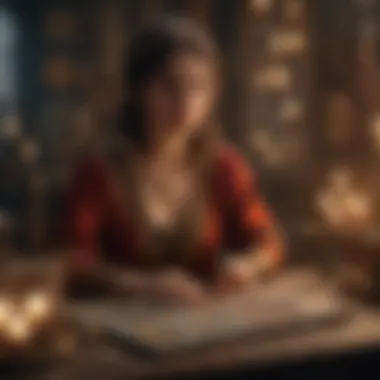

By recognizing both destiny’s potential and the power of free will, individuals are equipped to make choices that are reflective of their truest selves. This balance helps develop not only clarity but also a more profound understanding of their personal journey.
Utilizing Astrology and Tarot in Daily Life
Utilizing astrology and tarot in daily life provides individuals with practical tools to navigate their personal and professional environments. These esoteric practices offer not only foresight but also pathways for self-reflection and growth. In an increasingly complex world, where choices abound and uncertainties loom, harnessing the insights from these mystical systems can act as a compass.
Integrating Astrological Insights into Personal Goals
Astrological insights can significantly influence how one sets personal goals. By understanding one’s natal chart and current transits, individuals can identify favorable periods for embarking on new projects or making significant life changes. For example, a person with a strong influence of Mars in their chart might find that initiating goals during Aries season enhances their motivation.
- Identify Life Themes: Each zodiac sign governs particular life themes. Knowing one's sun sign can illuminate key areas for goal-setting. A Virgo may focus on health and organization, while a Leo may prioritize creative pursuits.
- Timing is Key: Planetary movements can impact one’s energy and focus. Utilizing astrology means aligning goals with auspicious timings for increased success.
Using Tarot for Reflection and Clarity
Tarot serves as an invaluable tool for gaining reflection and clarity in day-to-day decision making. Each card drawn can reveal underlying issues, patterns, or obstacles that need addressing. This method encourages not just prediction but introspection.
- Card Interpretation: Each card holds multiple meanings which can resonate with one’s current situation. Regularly drawing cards helps to cultivate a deeper connection with oneself and can illuminate thoughts and feelings that might not be readily acknowledged.
- Daily Draws: Implementing a daily tarot draw can become a grounding practice. This process promotes mindfulness, enabling individuals to start their day with insight into potential challenges or opportunities.
Moreover, integrating astrology and tarot can promote a holistic approach to personal development. By combining celestial insights with tarot's reflective nature, individuals can foster deeper understanding of their life paths.
Understanding your astrological framework, paired with tarot's reflective ability, creates a powerful synergy for personal transformation.
Astrology and tarot are not mere tools of fortune-telling. Instead, they serve as frameworks for understanding oneself more profoundly. Recognizing how to harness these practices can lead to a more fulfilling and directed life.
Challenges in Astrology and Tarot Interpretations
The practice of astrology and tarot reading offers profound insights, yet it is not without its challenges. Understanding these obstacles is essential for both practitioners and seekers. The value of recognizing skepticism and misinterpretations helps ensure that astrology and tarot remain effective tools for guidance rather than sources of confusion or undue influence.
The Importance of Addressing Difficulties
Discussing challenges in the context of astrology and tarot is vital. It opens the discourse on the credibility of these practices and invites honest evaluation. Identifying the hurdles faced allows both practitioners and clients to navigate the intricate landscape of divination better. Miscommunications can lead to distrust and misguidance, ultimately undermining the efficacy of these practices.
Skepticism and Criticism of Divination
Skepticism surrounding astrology and tarot is a prevalent issue. Many skeptics argue that such practices lack empirical evidence. The critics often underscore that outcomes cannot be scientifically validated. This view can prompt a defensive stance among proponents.
"Skepticism can serve as a tool for critical thinking, yet it should not dismiss the experiences of others wholly."
To combat this skepticism, practitioners can focus on educating others about the symbolic language of astrology and tarot. Articulating how these mediums work—not as predictions but as reflections—can bridge understanding. Furthermore, sharing testimonials can offer concrete examples of how these systems have aided individuals in feeling understood and supported.
Navigating Misinterpretations and Overreach
Misinterpretations can arise in both astrology and tarot readings. When practitioners overreach by asserting absolutes, it can lead to harmful consequences. Clients may place undue weight on one predictive statement, potentially affecting their decisions in important life matters.
To navigate these pitfalls, practitioners need to communicate the probabilistic nature of interpretations clearly. This shift in discussion from deterministic outcomes to possibilities helps manage expectations. In addition, reinforcing personal agency is critical.
Practices to Consider:
- Encouraging questions: Practitioners should prompt clients to ask about details or clarifications. This engagement enriches understanding.
- Setting boundaries: Clear guidelines on what a reading can provide helps limit overreach.
- Pursuing continual learning: Both clients and practitioners benefit from ongoing education in astrology and tarot. With deeper knowledge, everyone can engage more effectively with these tools.
The Future of Astrology and Tarot
The future of astrology and tarot is multifacted and intriguing. As society evolves, so too does the understanding and application of these ancient practices. People are now more open to exploring the complexities of their lives through astrological insights and tarot readings. Both fields offer valuable tools for self-exploration and decision-making. In this light, it is essential to understand how contemporary innovations and societal shifts can reshape astrology and tarot.
Modern Innovations in Astrological Practices
Astrology is adapting to technological advancements and modern values. New methodologies and tools are emerging. Tools like apps and software for analyzing astrological data are on the rise. These platforms streamline the process, making complex astrological concepts more accessible. For instance, apps such as Co-Star and The Pattern provide daily insights based on user profiles. This democratization of astrology helps foster a community of enthusiasts who can share their experiences and insights.
Additionally, astrology is becoming more inclusive. It is integrating different cultural perspectives, such as Vedic astrology and other forms from around the globe. This can enhance the richness of astrological practices, creating a more comprehensive understanding for practitioners.
"Astrology is not just about prediction; it’s an evolving discipline that reflects human experiences and societal changes."
The Digital Age and Its Impact on Divination
The advent of the digital age has significantly affected how people experience divination practices. Online platforms have emerged that make tarot readings and astrological consultations easily accessible. Tarot websites and social media groups allow for immediate connection with readers around the world. This has expanded reach and accessibility significantly.
Moreover, online communities have emerged, allowing people to share their tarot experiences and seek guidance. Platforms like Reddit and Facebook groups foster discussions and support among users, breaking geographical barriers. This also leads to a fusion of ideas and techniques between readers. In this way, collective wisdom is shared, enriching personal practices and interpretations.
Furthermore, the rise of e-learning has made education in astrology and tarot more accessible. Online courses are available for enthusiasts at all levels, promoting deeper understanding. This approach addresses the curiosity of new practitioners while offering ongoing development for seasoned professionals.
The integration of virtual reality and augmented reality in tarot and astrology presents fascinating potential. Future practices may involve immersive experiences that deepen the connections between readers and the spiritual realm, enhancing understanding and insight.
Finale: Embracing Your Future
In this article, we explored various elements of astrology and tarot. These disciplines offer more than forecasts; they provide tools for self-awareness and guidance. Understanding the insights gained from astrology and tarot can empower individuals to embrace their unique journeys. Each practice introduces a framework to evaluate both choices and chances in life. By analyzing zodiac signs or interpreting tarot readings, one sees opportunities and challenges uniquely.
Reflecting on Insights Gained
As individuals reflect on the insights derived from astrology and tarot, it is essential to appreciate how these revelations promote personal growth. For example, an astrological reading can reveal inherent traits associated with a specific zodiac sign. Knowing one's tendencies allows for deeper self-acceptance. Similarly, tarot readings can spark realizations regarding current life circumstances. By acknowledging these insights, people can enhance their decision-making process and develop strategies to navigate their paths effectively. Connection between the astrological signs and tarot interpretations often enhances the clarity of both practices.
"Understanding your personal qualities allows you to make better choices that align with your true self."
Furthermore, reflecting on these insights means considering how they have influenced relationships and professional interactions. This perspective fosters a more profound understanding of interpersonal dynamics and encourages adaptation.
Encouragement to Continue Exploring
The realms of astrology and tarot are complex and vast. Continuing to explore these practices not only enriches knowledge but also enhances practical application. Engaging with communities, whether through Reddit discussions or local workshops, can deepen this understanding. Each new encounter within these fields serves to illuminate the deeper layers of knowledge.
Additionally, keeping a journal of astrological insights and tarot spreads over time can facilitate an individual's growth. This personal documentation helps in recognizing patterns and shifts over days, months, or even years, further solidifying the connection to one's unfolding narrative.
Encouraging consistent exploration of astrology and tarot not only allows for personal reflection but also opens avenues for shared experiences. This communal aspect fosters a learning environment where insights are exchanged and cultivated, leading to a richer understanding of both disciplines. In this way, embracing your future becomes an evolving journey supported by shared wisdom.


